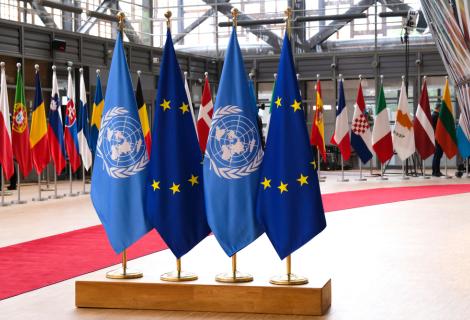
Multilateralism in a Contested World: Power, Justice and the EU’s Interest
At COP29 in Baku, EU Commissioner Hoekstra took the floor to praise multilateralism and welcome a long-awaited climate finance deal. Yet just seconds earlier, the agreement had been met with strong objections from Nigeria and India—two of the largest democracies of the Global South—who considered it deeply unfair. Last week in Bonn at SBs 62, EU representatives defended their “constructive approach” amid accusations of blocking progress on finance, calling these criticisms “mischaracterisations.” And in New York, during the Financing for Development (FfD4) negotiations, the EU dissociated itself from final paragraphs on debt and climate finance—provisions it had already worked hard to weaken—while simultaneously declaring the outcome a success for multilateralism. This recurring pattern raises a fundamental question: Why does the EU celebrate outcomes that its negotiating partners increasingly view as insufficient or unjust?
Multilateralism: A Clash of Realities
One consistent sticking point is the Means of Implementation. Both climate and development frameworks are premised on the principle of “common but differentiated responsibilities,” recognising that while the challenges are shared, countries are unequally endowed to address them. The vast majority of developing countries are facing intersecting crises that threaten their future: an accelerating climate emergency, soaring debt, capital flight through tax avoidance, limited access to affordable finance, and shrinking public budgets. Aid is declining and increasingly tied to European economic interests, often reinforcing extractive trade patterns. Technology transfer remains a broken promise, most notably during COVID-19, when European states refused to lift intellectual property protections on vaccines.
While the EU undeniably recognises these challenges, it systematically depoliticises them. Development and climate issues are framed as ahistorical problems requiring those affected to replicate the “European model.” Addressing them becomes, in this context, a technical exercise: redirecting capital where it’s most needed. Country platforms, taxonomies, ESG frameworks, carbon markets, financial disclosure, and de-risking become public policy tools to steer transitions and development pathways—pathways otherwise shaped by the private sector. In the same liberal tradition, support—where possible—is directed toward the most vulnerable, particularly those most impacted by these policy shifts.
Multilateralism: Between Power and Justice
But this model is proving an "illusion". The reason is political: these are not merely technocratic challenges, but the result of deep, historically rooted power asymmetries. The international architecture—from trade rules to debt regimes to climate finance—was not designed to empower the Global South or deliver sustainability. On the contrary, these structures have historically concentrated wealth and influence in the hands of the few. The EU’s own industrial and economic strength is built, in part, on unequal trade relations and global extractivism. Today, the green transition is reproducing those same dynamics, as Europe secures raw materials, hydrogen, and renewable energy from resource-constrained partners without redistributing value or decision-making power.
As a result, many developing countries no longer accept the EU’s self-serving model of multilateralism: one that preserves existing hierarchies while claiming moral credit. They seek instead a genuine rebalancing of power—across climate governance, global finance, trade, and development cooperation. Not only because the current model is producing the very crises they face, but because this is, at its core, a matter of justice and right to development.
Crucially, they now have the leverage to act. What the EU views as bad faith, unrealistic demands, or procedural fights is, in fact, a sign of increased power—used to renegotiate terms in regimes where many have long been excluded.
Multilateralism and the Redistribution of Power
This shift is creating a more defensive posture for EU negotiators. The EU’s insistence on its multilateral credentials is often met with scepticism in rooms where partners recall its efforts to dilute more equitable proposals. Developing countries are not “winning” because they’ve better negotiating tactics—they are gaining ground because their demands reflect a collective and legitimate aspiration to rebalance both governance and global economic structures.
Multilateralism can no longer function under the same structural arrangements that produced today’s inequalities. Many developing countries are no longer willing to cooperate on terms that perpetuate injustice—and many now have the power to oppose them. The EU can no longer set those terms unilaterally.
This is the new political reality. Multilateralism will be, increasingly, truly multilateral. It will require the redistribution of power and wealth; not out of moral obligation, but out of political necessity. Anything less will at best preserve form without substance: a hollowed-out multilateralism that delays the inevitable—demands for a more balanced order.
The EU’s Interest in Multilateralism
This shift is beyond EU control. It reflects the growing agency of the Global South. In fact, the EU’s share of global GDP in 2022 was nearly identical to what it had been for 1800 years—underscoring the historically disproportionate accumulation of wealth during the colonial era. In a world where power and capital are increasingly concentrated outside its borders, the EU has a fundamental interest in shaping a multilateral system that delivers for the many, not the few.
Rather than resist, the EU should embrace this change and seek to shape it. That begins with acknowledging the need to give up some historical privileges and to leverage its influence to co-create a global order that is more just and sustainable.
The reality of the world today is not in contradiction with the EU’s interests. The vast majority of countries—including the largest Southern democracies—reject hegemonic rivalry. They seek to develop, and to address climate change, on fairer terms. Their interests lie in building a more balanced global order. And that order, if shaped inclusively, aligns with the founding principles of the European project: equality, democracy, multilateralism, and a rules-based international system.